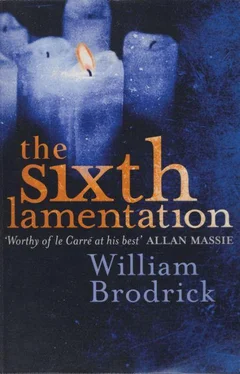William Brodrick - The Sixth Lamentation
Здесь есть возможность читать онлайн «William Brodrick - The Sixth Lamentation» весь текст электронной книги совершенно бесплатно (целиком полную версию без сокращений). В некоторых случаях можно слушать аудио, скачать через торрент в формате fb2 и присутствует краткое содержание. Жанр: Триллер, на английском языке. Описание произведения, (предисловие) а так же отзывы посетителей доступны на портале библиотеки ЛибКат.
- Название:The Sixth Lamentation
- Автор:
- Жанр:
- Год:неизвестен
- ISBN:нет данных
- Рейтинг книги:5 / 5. Голосов: 1
-
Избранное:Добавить в избранное
- Отзывы:
-
Ваша оценка:
- 100
- 1
- 2
- 3
- 4
- 5
The Sixth Lamentation: краткое содержание, описание и аннотация
Предлагаем к чтению аннотацию, описание, краткое содержание или предисловие (зависит от того, что написал сам автор книги «The Sixth Lamentation»). Если вы не нашли необходимую информацию о книге — напишите в комментариях, мы постараемся отыскать её.
The Sixth Lamentation — читать онлайн бесплатно полную книгу (весь текст) целиком
Ниже представлен текст книги, разбитый по страницам. Система сохранения места последней прочитанной страницы, позволяет с удобством читать онлайн бесплатно книгу «The Sixth Lamentation», без необходимости каждый раз заново искать на чём Вы остановились. Поставьте закладку, и сможете в любой момент перейти на страницу, на которой закончили чтение.
Интервал:
Закладка:
Bartlett had said that Schwermann had occupied a minor clerical post in the SS; had never visited a concentration camp; and had never ‘witnessed any of the horrific sights so forcefully described by the courageous lady whose testimony we have just heard’. Schwermann admitted he knew the deportees were going to Auschwitz but he believed this was a staging post on the way to Palestine, part of a wider policy of forced emigration. And as for the smuggling ring, he accepted that he brought to the attention of his superiors information that had come into his possession, but he had no influence or insight into what would happen to them afterwards. While there was no burden on the Defendant to prove his innocence, in this particular case the Prosecution would be shown to flounder without particulars, clutching at circumstantial evidence.
So that was the strategy: four big points, just as Roddy had predicted — three overt and one concealed. The first, a complete denial of ever having seen the machinery of a death camp. Second, a sincere belief that ‘evacuation’ meant just what it said. And third, the fate of the smuggling ring had been handed over to others. Technically, this meant Schwermann denied being part of a joint enterprise whose object or possible outcome was death or serious harm. Bartlett sensibly avoided stating his fourth argument because its inherently comic properties undermined its force: the ‘I was only obeying orders’ defence. But Anselm knew the jurors would be led along by frequent references to Schwermann’s youth, his lowly rank and the power of others. There would be no laughter and the point would be forcibly made. It might even coalesce into pity.
Bartlett’s disclosure, however, was alarming in other respects: there was no reference to Les Moineaux and no mention of Schwermann having saved life rather than taken it away The riddle remained an unexplained secret. Anselm had just turned to the obituary pages in search of light entertainment when he heard a sober voice at his elbow
‘Father, if we hadn’t shared the cup of plenty I’d think you were hiding from me.’
Anselm blenched.
‘I thought I’d give my legs a big stretch, before hitting Sao Paulo. And I have a few answers from the realm of Sticky Fingers.’
2
Lucy left the court half an hour before the end of the morning session in order to meet Father Anselm, the monk. She had been surprised to hear his voice on the telephone the night before. He was coming to London and had an important matter to discuss with her. He’d told her not to worry. They met outside St Paul’s Cathedral and sat on the steps. Apparently it was something he’d often done when he’d been at the Bar, taking a breather from a savaging at the Old Bailey ‘That court, ‘he said, ‘was the scene of some of my more spectacular failures.
After a moment’s reflection the monk said, ‘Lucy, I have a letter from a man who knew Agnes Aubret. It was written during the war by Jacques Fougeres, the father of her child, and given to this man for safe-keeping, to be delivered to Agnes if she survived the war. He has asked me to deliver it to her. I believe you know the Agnes I seek.’
‘I do, she’s my grandmother.’ The rapid mix of nausea and wonder acted for the moment like a sedative. She spoke with a calculation she did not possess. ‘She has motor neurone disease. She can’t walk or talk but she understands everything. Her inner life is all she has left. Can I ask who gave you the letter?’
‘Mr Snyman. I’m sorry, the name means nothing to me.
‘He was a Jewish refugee, from country after country. He played the cello, with my grandmother at the piano. I’ve never heard her play but you can tell, once you know, by the look of her hands… the fingers are long and beautiful and they’re always reaching out for something.’ Completely without warning she started to cry, not tragic sobs, cracked cheeks and hissing valves, just free-flowing water upon smooth ivory skin; water that would not stop, that she did not want to stop, that she wanted to run for ever, down her face, her body, and into the sea. ‘She was a member of The Round Table. She saved children but lost her own. She survived Auschwitz and Ravensbruck and saved two other children; one, my aunt, who died without being told, and the other, my father, who still doesn’t know. Now she lies dying, unable to speak, unable to move; she’s lost everything, everything, except her breath. Tell me, if you know, because I don’t, why can’t she be given something, just this once, before she dies?’
‘I suspect this won’t surprise you,’ said the monk, ‘but there aren’t any satisfactory answers to questions like that. In. a funny way all we can do is listen. Can I give you some consolation?’
‘Please do.’
‘The best people I have ever met are the ones who’ve carried on listening.’
Lucy thought of Agnes, often silent, always attentive in a way that was foreign to all those around her.
‘And another is this,’ said the monk. ‘If you keep listening, you still don’t get any answers but more often than not the questions slip out of reach and cease to be questions. The bad news is that it takes about ten years.
‘Thanks. And what about the ones that stay?’
‘We’ve a choice — either the whole shebang’s absurd… or it’s a mystery.’
Again Lucy thought of Agnes, absurd to none, a mystery to anyone who knew her. Rummaging for a handkerchief, her eyes swollen and smarting, she said, ‘I’ll arrange a meeting for you with my grandmother, but it will have to be after the trial. She’s entirely focused on its outcome. A letter from Jacques, now, could overwhelm her.’
The monk shuffled on the step. He said, ‘This weekend I hope to meet Victor Brionne:
A suffocating exhilaration rose and pressed against Lucy’s chest as she spoke: ‘I must talk to him.’
‘That would be most unwise. If it became known that someone who had been observing the trial had spoken to a key witness, all hell would let loose… or, indeed, if I said anything to him on your behalf. You will have to let things run their course.
Lucy could only laugh. The trial itself had now silenced whatever she could have said on Agnes’ behalf. The displacement of Agnes was complete. She said, still laughing hoarsely, ‘I had hoped to make sure Brionne told the truth about Schwermann.’
The monk’s face darkened. ‘Perhaps he will.’
‘Take it from me,’ said Lucy miserably, ‘he won’t.’
Strangely sad, and with compassion, the monk said, ‘If Victor Brionne gives evidence at the trial, I hope he doesn’t disappoint you.’
Before Lucy could remonstrate he changed the subject.’ You must have found the death of Pascal an awful shock.’
‘I did. I still do.’ Lucy watched the busy pedestrians walking criss-cross on the pavement below They’d finish work tonight and go for a drink, unwind and complain about the boss or their mortgage; then they’d go home. ‘One of the reasons he met Max Nightingale was to say he had nothing against him. Frankly, I couldn’t see the point.’
Father Anselm mused a little and said, ‘When I first became a monk, there was an old member of the community, a dreadful chap, always cross, murmuring a lot as we say in our way of life. When he was dying I went to see him and he said, “Anselm, all that matters are tiny reconciliations. Be reconciled whenever you get the chance.” At the time it struck me as rather sad, but later I wondered if he’d made a discovery bigger than himself.’
Lucy thought Pascal would have agreed. Herself? Yes, but not yet, some other time. She said, ‘Have you any consolations for the grief-stricken?’
‘No. Terrible business. Nothing to recommend it whatsoever.’
Читать дальшеИнтервал:
Закладка:
Похожие книги на «The Sixth Lamentation»
Представляем Вашему вниманию похожие книги на «The Sixth Lamentation» списком для выбора. Мы отобрали схожую по названию и смыслу литературу в надежде предоставить читателям больше вариантов отыскать новые, интересные, ещё непрочитанные произведения.
Обсуждение, отзывы о книге «The Sixth Lamentation» и просто собственные мнения читателей. Оставьте ваши комментарии, напишите, что Вы думаете о произведении, его смысле или главных героях. Укажите что конкретно понравилось, а что нет, и почему Вы так считаете.












